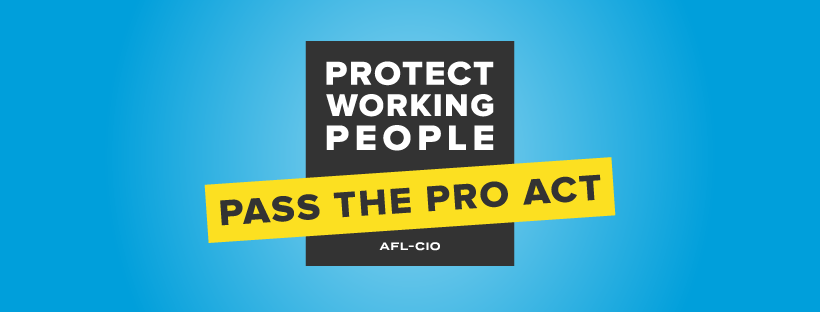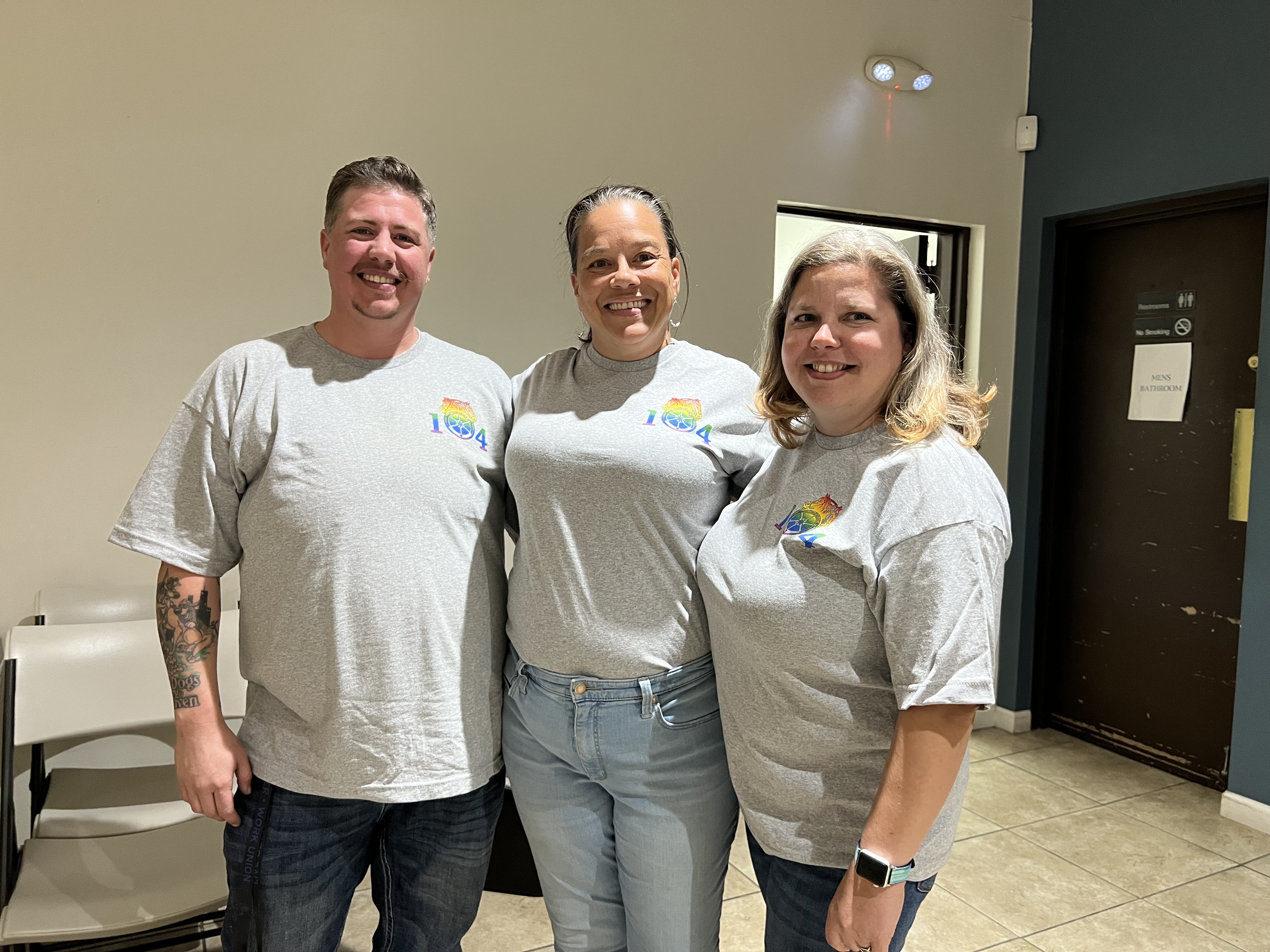|
|
John, |
|
This week, our Political, Legislative, and Organizing Director, Joe Murphy, and I, as an officer of the Executive Committee, attended the Grace Carroll Rocky Mountain Labor School, which took place in Butte, Montana, this year. This institution, one of the last of its kind, offers the most comprehensive and dynamic training program for labor leadership development. Whatever role you play in your local union, you are able to develop personal skills as a labor activist, learn about labor issues, and share personal experiences with your counterparts in order to build the labor movement. Joe Murphy, who has over a decade of experience in labor and political organizing, wrote this week's Labor Dispatch about the long-term effects of sharing our stories and standing in solidarity. |
|
|
|
"They made solidarity illegal?" JC asked me quizzically. That was one way to put it. We’d just been talking about an incident when he was a second-year apprentice. An awards show in Los Angeles was coming up, and a hotel was getting ready for it. His union was doing the work, and management was putting pressure on them to finish faster. With days left to go, the hotel’s housekeepers went on strike and threw up a picket line for reasons we’re all familiar with – low pay, long hours, lack of staff, lack of respect. JC had shown up at the jobsite first and didn’t know what he was allowed to do. When his foreman arrived (late), he disappeared to make a phone call, then had his crew enter the hotel from the alley, through a service entrance, and use a cargo elevator. Years later, JC had just told me that he wouldn’t have called his foreman; he’d have called his union hall, his business agent, his steward, or anyone else because he didn’t want to cross that picket line. That led to a brief discussion between us about how and why solidarity strikes were made illegal in a law that was passed nearly a century ago and how that law was the beginning of the decline in union membership in America. We’ve been in Butte, Montana, for a week, attending classes at Montana Technical University as part of the Grace Carroll Rocky Mountain Labor School. Labor History 1 and 2 are popular classes, but Contract Costing, Grievance & Arbitration, and Collective Bargaining are where skills that unionists are used to learning (and teaching) on the fly are presented in a classroom setting by professional teachers. The class JC and I were just finishing up was turning out to be popular, informative, and useful: Political Engagement for Union Members, being taught by my Political Director counterparts from Idaho and Montana, Jason Hudson and Amanda Frickle. Contrary to what JC asked me, solidarity hasn’t been made illegal, even though they’ve tried. We’re on the fifth day of GCRMLS, and you can tell that the effects of a week of learning, socializing, and walking at a high altitude are finally overcoming the caffeine, adrenaline, and solidarity that we’ve all been living on. Ideas and experiences are being shared as freely as union memorabilia among the students here, along with invitations to barbecues wherever back home is and commitments to follow up to find out more about a successful organizing or political plan. In two years, Arizona will host the Grace Carroll Rocky Mountain Labor School. By then, we may not have made solidarity strikes legal (which passing the PRO Act would do), but we will definitely continue to express solidarity in our actions. |
|
In solidarity, |
|
|
Fred Yamashita |
|
|
UPCOMING EVENTS & ACTIONS |
|
Block Party Fundraiser- Unemployed Workers United
Join Unemployed Workers United for an in-person fundraiser on Friday, July 21st at 7 PM to celebrate their 'Take back Our Homes' campaign! This packed City Hall and resulted in the passing of an anti-discrimination source of income ordinance which took effect in April. There will be food, music and get a chance to hear from organizers on the ground and workers fighting for their right to save, accessible and affordable housing. |
|
|
Vermont Relief Efforts
Vermont residents are again facing the reality of destruction on a massive scale. Roads are gone, cities and towns are flooded, and many residents remain cut off from the outside world. Brave and heroic union members on the Department of Public Works and Agency of Transportation crews, utility workers, power plant workers, first responders, and hospital staff are working around the clock to make sure basic life-sustaining services continue to function, lives are saved, the power is kept on and roads are rebuilt. You can help today by making credit card contributions to the Union Community Fund atgo.aflcio.org/relief or by mail:Union Community FundNote in the memo line: "Vermont Relief Efforts"815 Black Lives Matter Plaza NW, Washington, DC 20006. |
|
Urge REI to Restore SoHo Workers' Lost Wages
Last summer, as a result of workers organizing, REI introduced "The Way Forward," a new package of pay and benefits that was extended to green vests at every REI store across the country... except for Soho. Right on June 1, REI went ahead and advised our union it would cut pay-- up to 20%-- for many of our coworkers at the SoHo store despite them not engaging in a strike. They are are asking supporters to call on REI to restore pay and return to the bargaining table. |
|
|
How to Win HUGE Cash prizes from Union Plus
The 2023 Union Plus Labor Day campaign is here! The Unions Power America Contest is kicking things off, running through July 26. Union Plus is awarding $140,000 in cash prizes, including a $40,000 grand prize. The past few years have been hard for workers—so we want to help hardworking union families dream big. Union Plus wants to hear your stories—of going above and beyond for others and powering your communities, workplaces and families. Members can nominate themselves to win, or people can nominate any current or retired union member in their life to win by sharing their inspiring stories. |
|
|
2023 MALF Andy Ward Scholarship Packet AVAILABLE NOW!
The Maricopa Area Labor Federation is still looking for union members or dependents of union members to apply for the Andy and Dorothy Ward Scholarship to help with educational and vocational expenses. The essay, cover sheet, and application have been extended and are now due by 5PM on July 24th, 2023. Please send them to the MALF Education Committee Chair, AFT Arizona President Ralph Quintana, at [email protected]. |
|
|
Join the Arizona AFL-CIO Labor Book Club
Our goal is to explore the history, impact, and ongoing struggle of the labor movement. This is an open community event, inviting union members, potential members, and anyone interested in the labor movement to come together and discuss books that highlight the lives of workers and the many facets of unionized labor.
Don't miss out on the fun; we hope to see you there, and be sure to spread the word! |
|
|
Petition: Pass the Richard L. Trumka PRO Act
The Protecting the Right to Organize (PRO) Act is landmark worker empowerment, civil rights and social justice legislation. It is an essential part of creating an economy that works for everyone.
If we want to build up worker power, our outdated labor laws must keep up with the times. If you think we need to protect working people, take 30 econds to add your name in support of the PRO Act |
|
Julie Su Needs Your Help!
We know Su is the right person to support America’s workers. She’s never backed down from a fight when workers’ fundamental rights are on the line—and with your help, we’re not backing down either.
The problem? Well-heeled lobbyists and corporate special interests are spending big to block Su's confirmation because they know she puts working people first. Workers deserve a labor secretary who will fiercely defend us.
Call your senators now and tell them to vote to confirm Julie Su as secretary of the Department of Labor. |
|
Union Events and Action We want to uplift what you are doing for our members and our community!
Please fill out all the required information to have your Local's event uploaded to our Arizona AFL-CIO website or featured in our next Labor Dispatch. If you have any questions please reach out to Alina Cordoba, Communications & Operations Director at [email protected]. |
|
|
OPINION |
|
New Legislation Will Scapegoat Working Veterans for Leadership Failures, Harming VA Care
"As an Army veteran who receives health care from the VA, I’m proud that my union, the American Federation of Government Employees (AFGE), represents over 291,000 workers who have dedicated their lives to caring for their fellow veterans and ensuring America meets its obligations to those who have borne the battle. I’m especially proud that over a third of those workers are, like me, veterans themselves — American patriots who are wearing their second uniform in service to their country."
|
|
A Road to Defend Workers and Our Families
"The confidence and determination shown by striking Los Angeles hotel workers is a boost to the entire labor movement. Thousands-strong, UNITE HERE Local 11 members walked off the job to fight insufficient wages and unlivable schedules and conditions that tens of millions of fellow workers share. Their fight is in the interests of all workers. Alongside efforts to win much-needed solidarity, their fight poses questions about the broader program unions need to advance to protect workers and our families from the crushing impact of today’s capitalist crisis."
|
|
|
NATIONAL NEWS |
|
Hollywood Actors Strike TV and Movie Actors Vote for Biggest Walkout in Four Decades
"The Hollywood actors’ union approved a strike on Thursday for the first time in 43 years, bringing the $134 billion American movie and television business to a halt over anger about pay and fears of a tech-dominated future. The leaders of SAG-AFTRA, the union representing 160,000 television and movie actors, announced the strike after negotiations with studios over a new contract collapsed, with streaming services and artificial intelligence at the center of the standoff. On Friday, the actors will join screenwriters, who walked off the job in May, on picket lines in New York, Los Angeles and the dozens of other American cities where scripted shows and movies are made. "
|
|
The Energy Transition is Underway. Fossil Fuel Workers Could Be Left Behind
"The United States is undergoing a rapid shift away from fossil fuels as new battery factories, wind and solar projects, and other clean energy investments crop up across the country. An expansive climate law that Democrats passed last year could be even more effective than Biden administration officials had estimated at reducing fossil fuel emissions. While the transition is projected to create hundreds of thousands of clean energy jobs, it could be devastating for many workers and counties that have relied on coal, oil and gas for their economic stability. Estimates of the potential job losses in the coming years vary, but roughly 900,000 workers were directly employed by fossil fuel industries in 2022, according to data from the Bureau of Labor Statistics. "
|
|
Brown Calls on FTC to Prioritize Workers in The Microsoft-Activision Blizzard Proposed Merger
"U.S. Senator Sherrod Brown (D-OH) called on the Federal Trade Commission (FTC) to consider Microsoft’s novel, standard-setting labor neutrality principles when evaluating the Microsoft-Activision Blizzard proposed merger. Microsoft’s labor neutrality agreement is an historic step forward in the tech industry and should serve as an example of the collaboration between American companies and workers that’s necessary for success in the 21st century economy. "
|
|
SEGA of America Workers Vote to Unionize
"Workers at Sega of America, the North American branch of the Japanese company behind Sonic the Hedgehog, voted on Monday to form the first multi-departmental video game union in the U.S. The vote was held as a mail-in election beginning on June 16, and ballots were counted on July 10 by a National Labor Relations Board representative from Region 21 in Los Angeles. The approximate number of eligible voters was 212. Out of 136 valid votes cast, there were 91 votes for unionization, and 26 votes against. Additionally, there were 19 ballots challenged, and three ballots marked as void, due to identifying information.”
|
|
Summer of Labor Strikes
“Liz Shuler, AFL-CIO President discusses labor negotiations and the impact AI will have on workers. She speaks with David Westin on 'Wall Street Daily.'"
|
|
|
|
|
Arizona Teamsters Ready to Strike for First Contract at Republic Services
“Teamsters Local 104 members in Phoenix have voted by 99 percent to authorize a strike at Republic Services after months of contentious contract negotiations for a first contract. The 116 waste workers seek to address years of concerns regarding pay, health care, safety, working conditions, and lack of respect. The company continues to stall in negotiations and has committed several unfair labor practice (ULP) charges during the workers’ organizing and bargaining efforts. "
|
|
Workers at Another Gilbert Starbucks Vote to Unionize for Better Conditions
“Stores that have unionized have accused Starbucks of not negotiating in good faith. Now, another Starbucks in Gilbert has voted to unionize, joining 7 others in Arizona."
|
|
|
Pride at Work Meeting- AZ Chapter |
|
|
|
|
|
Thank you for reading the Arizona Labor Dispatch! Can you help us grow our readership by sharing our sign-up form? |
|
|
|
If you'd like to promote an event for your union in our weekly newsletter, fill out our submission form or email AZ AFL-CIO Communications & Operations Director Alina Cordoba at [email protected] |







.jpeg)